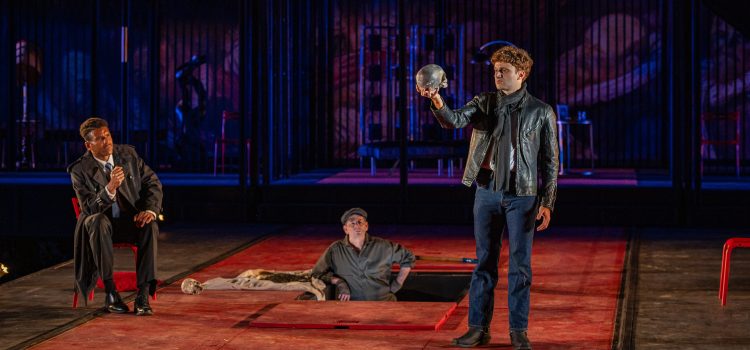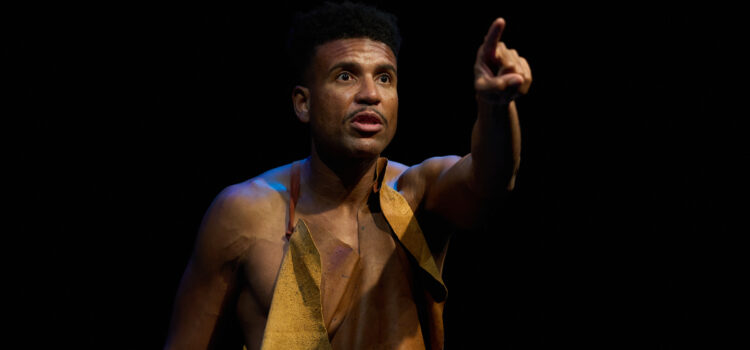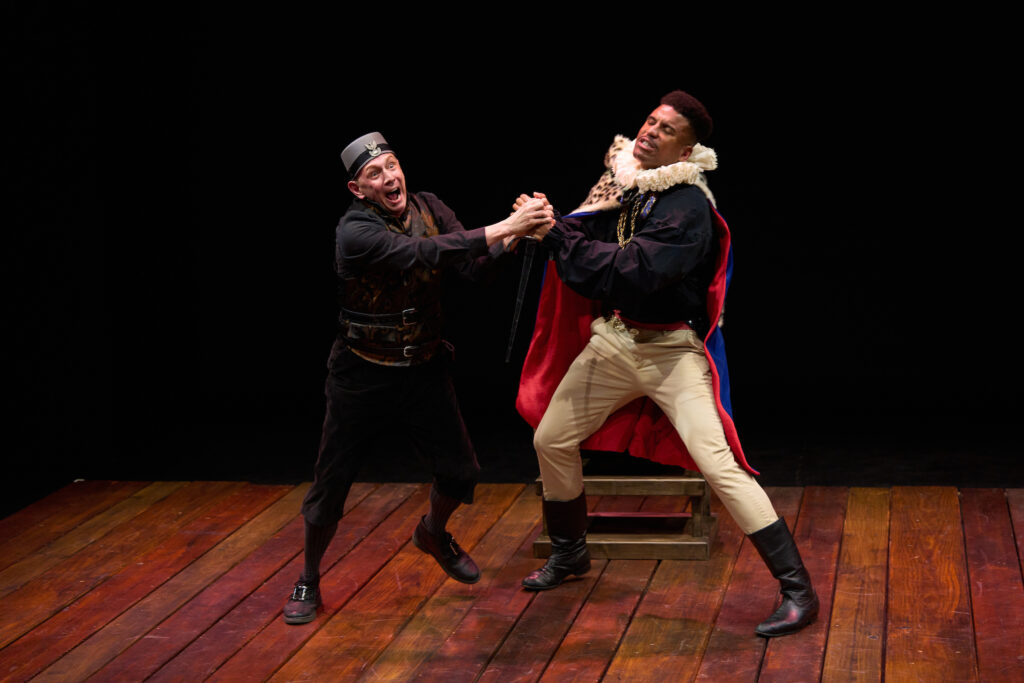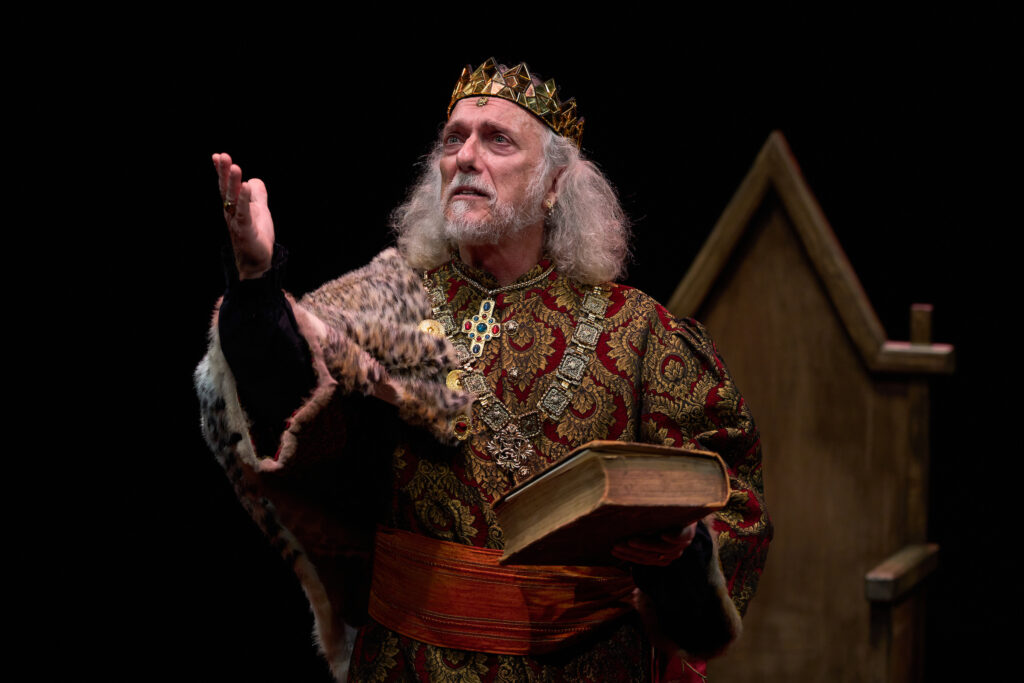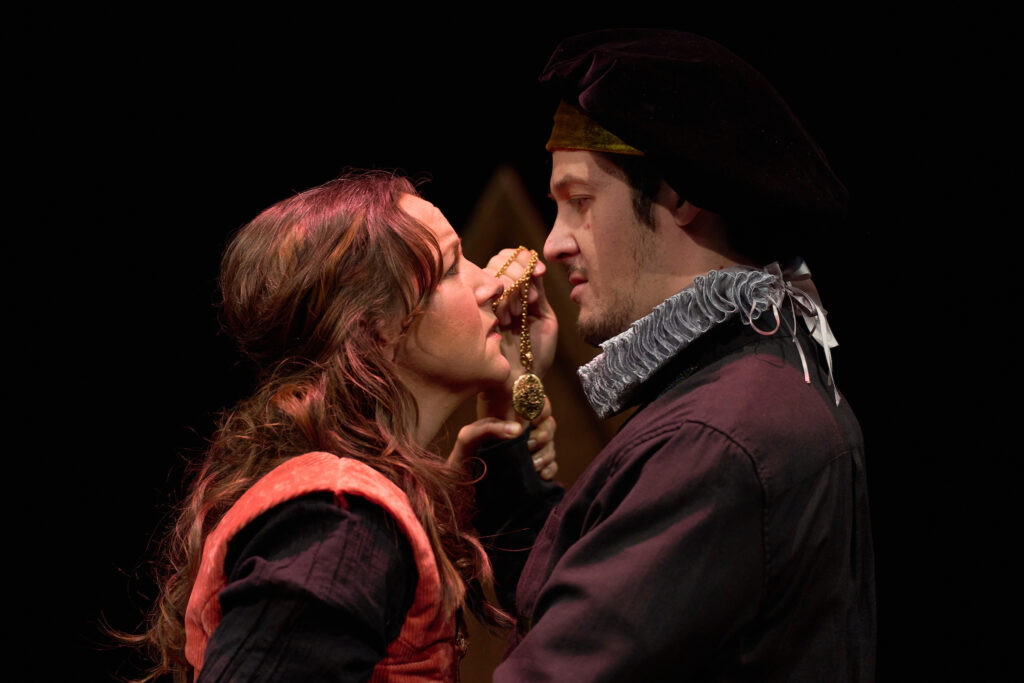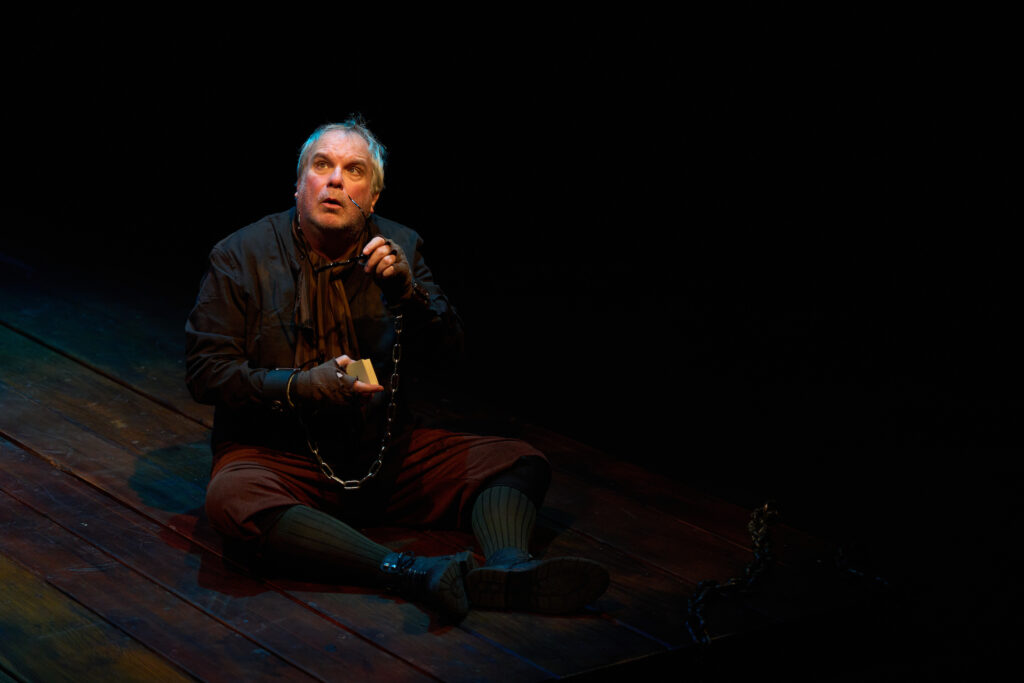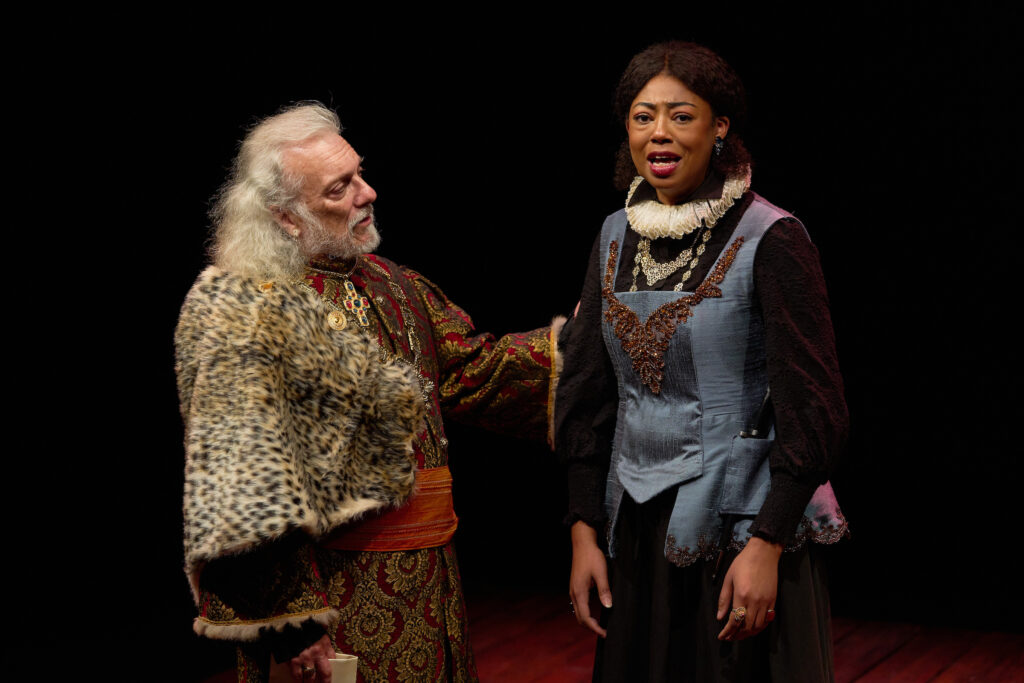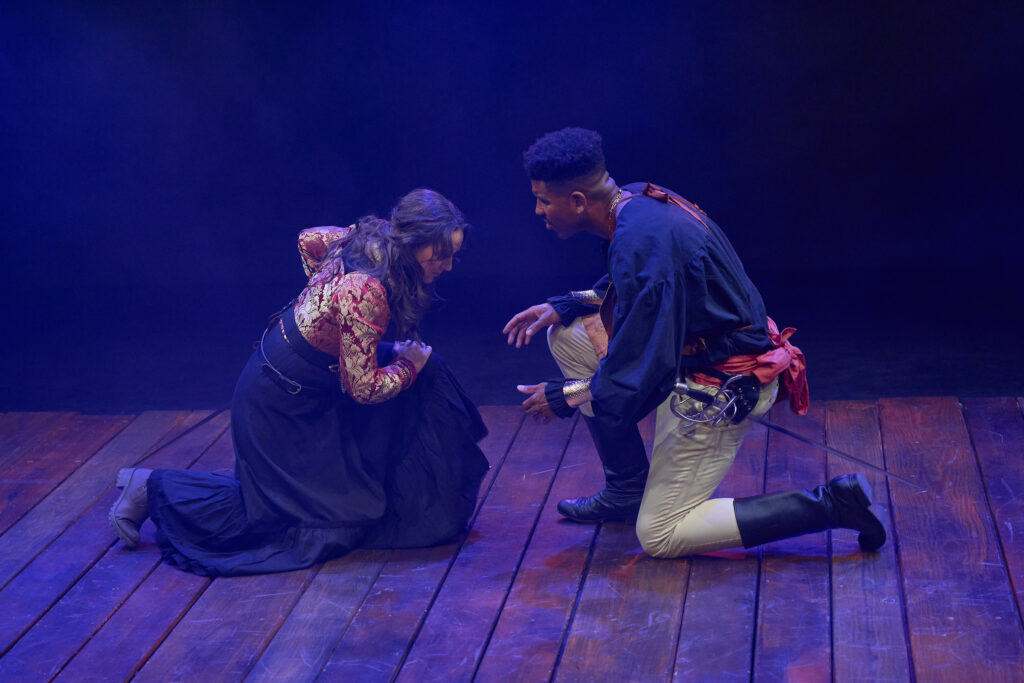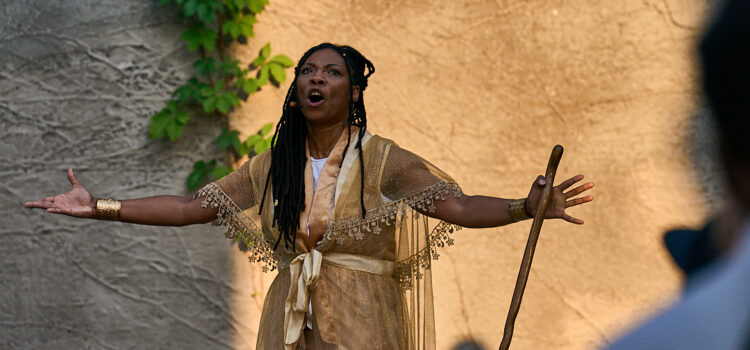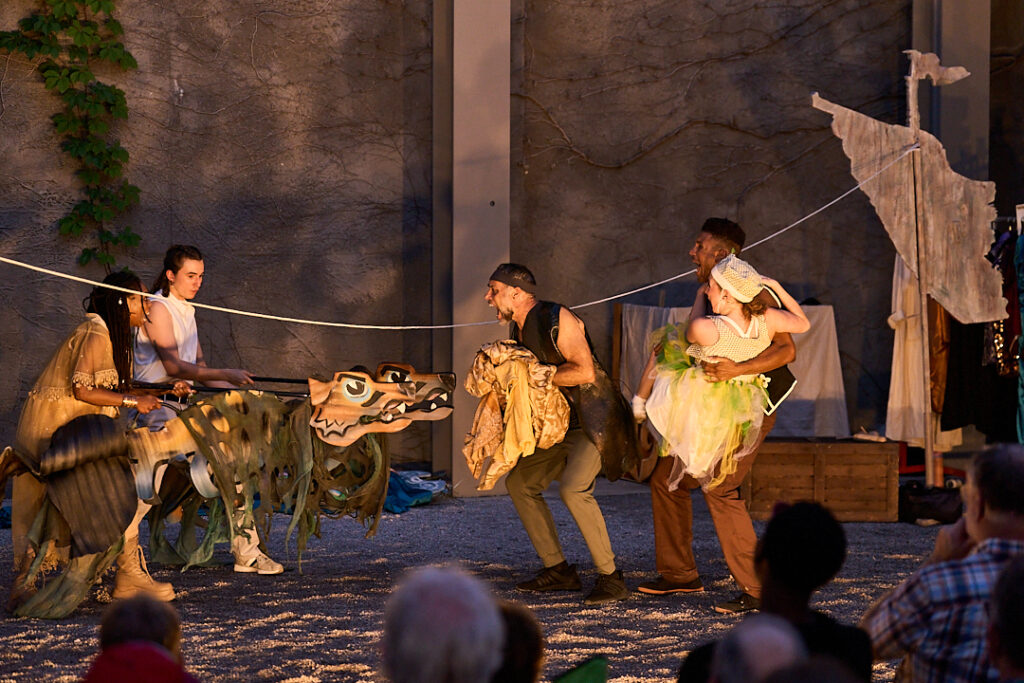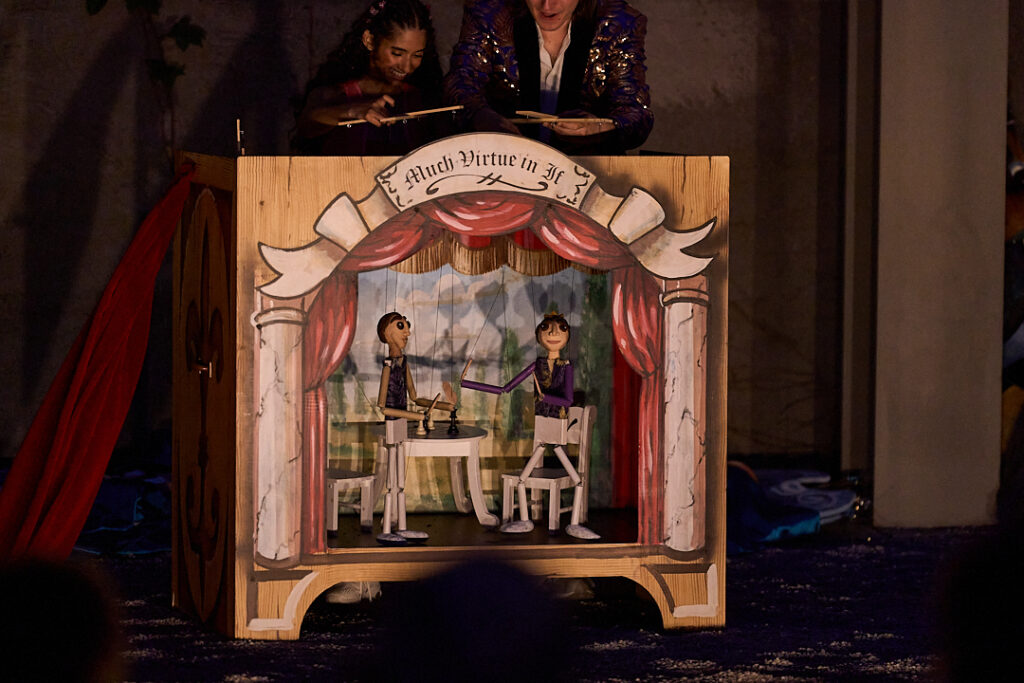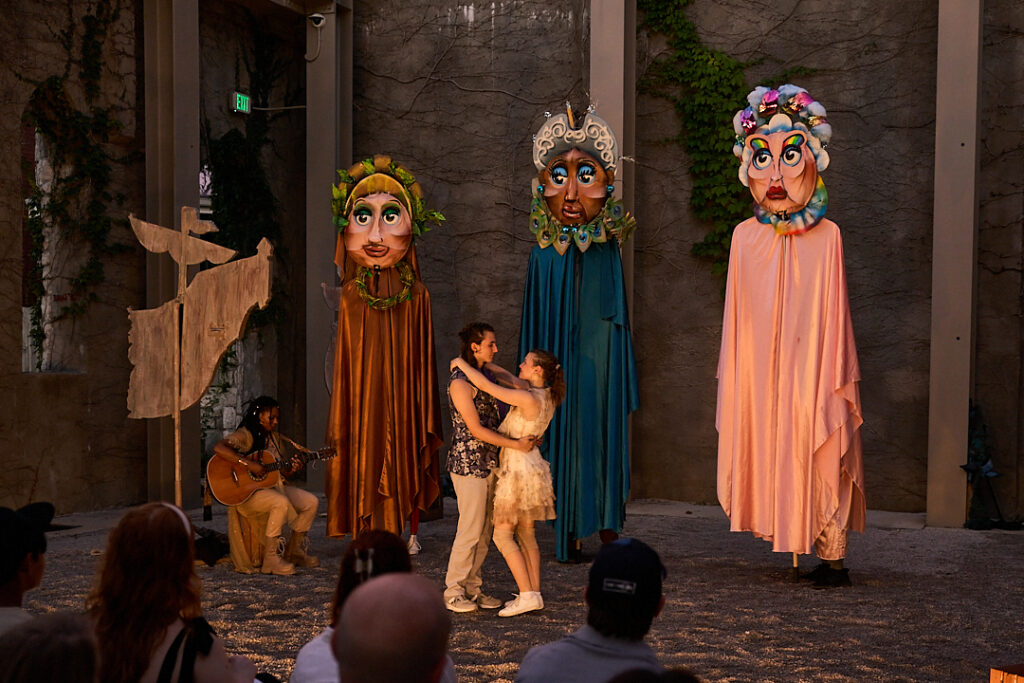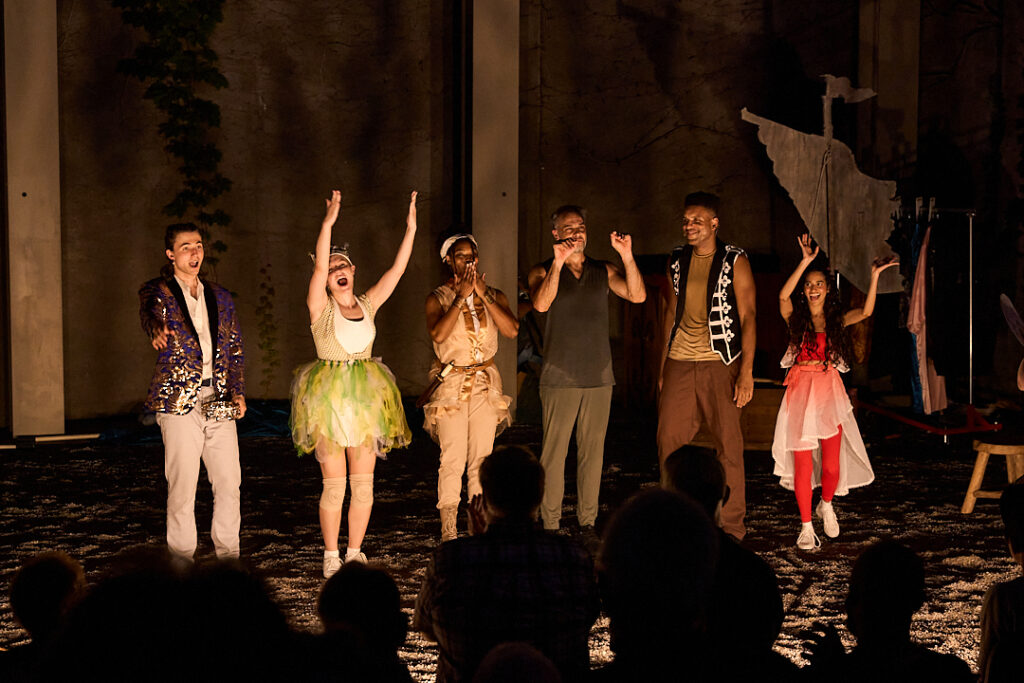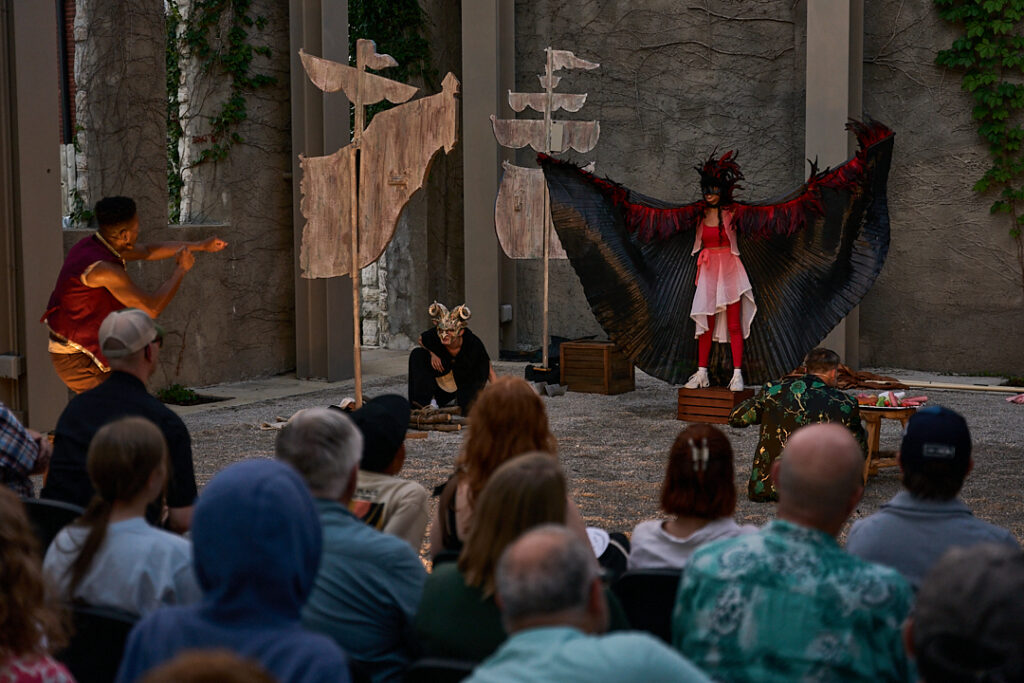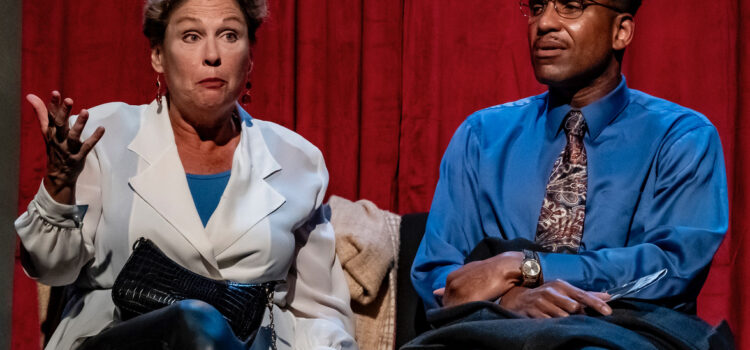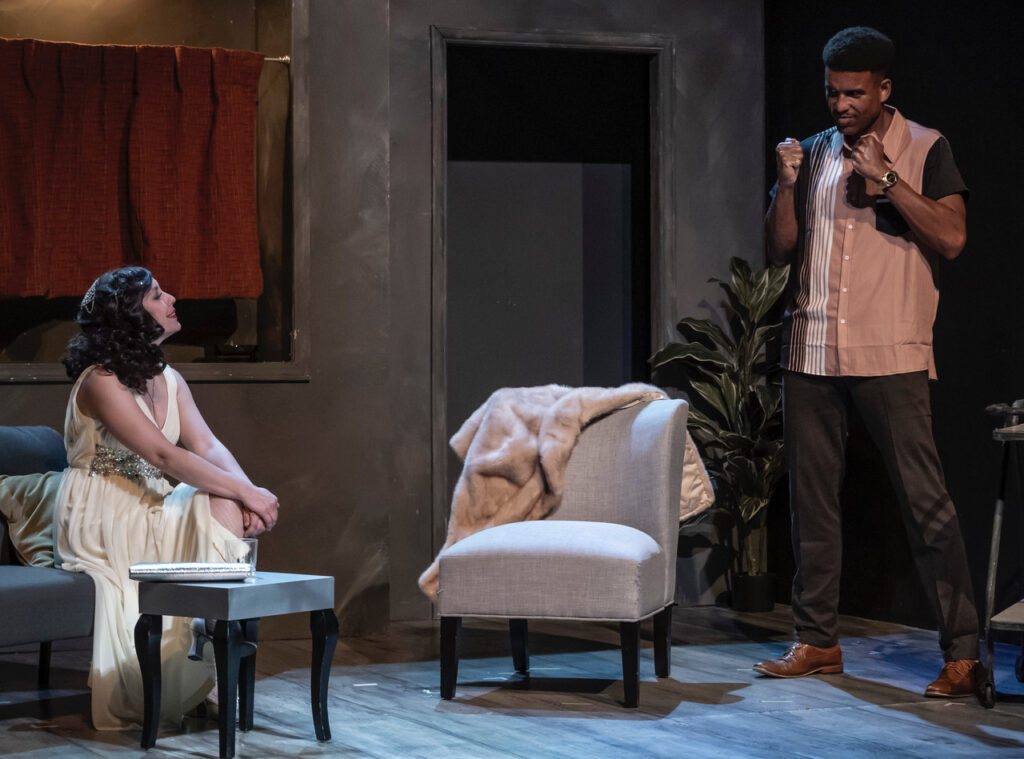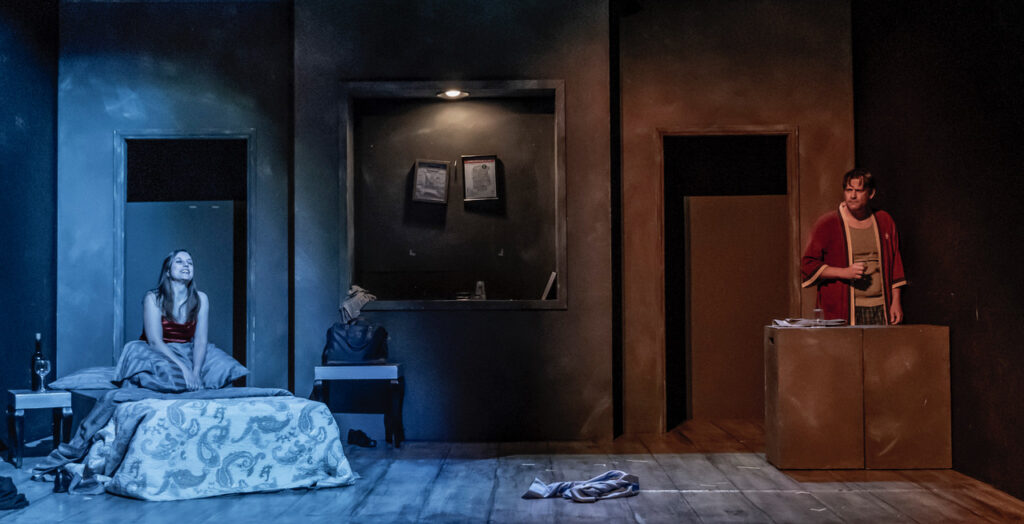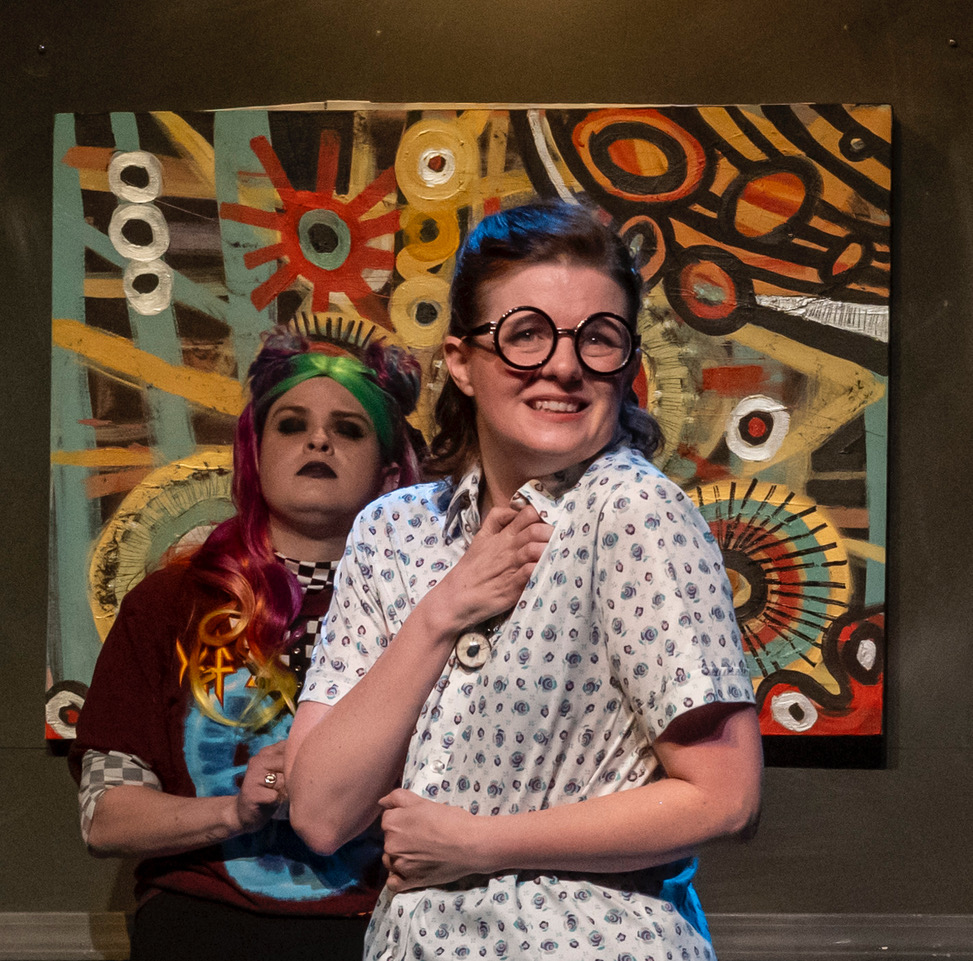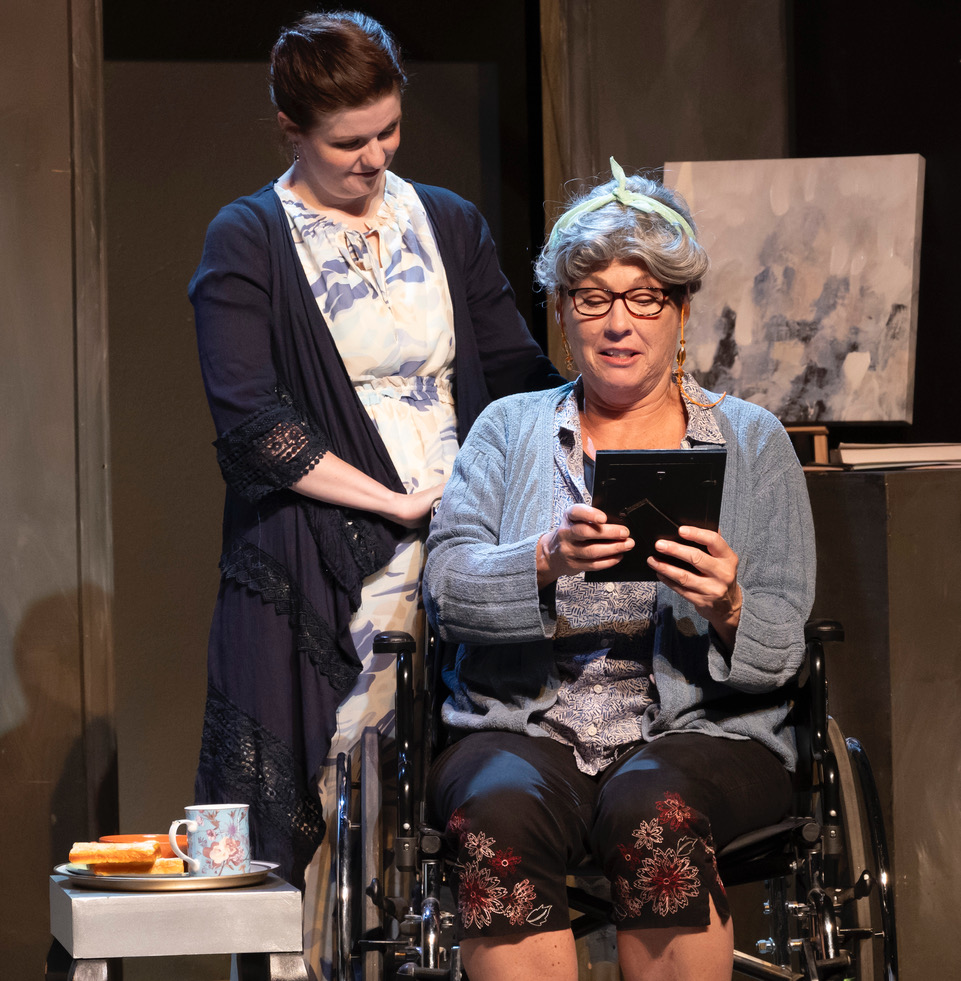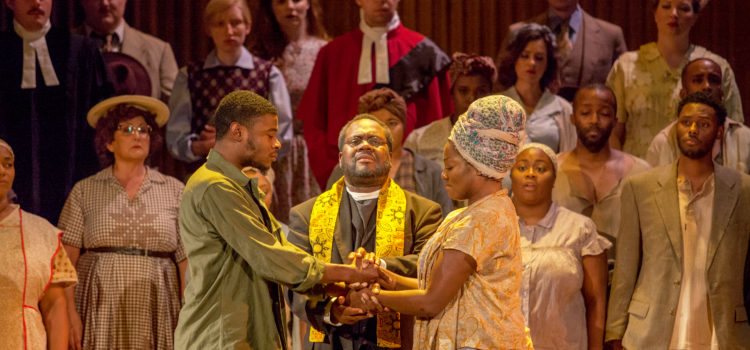By Lynn Venhaus
An invigorating energy, combined with an intriguing neo-noir atmosphere, mark an unforgettable milestone production of William Shakespeare’s most famous work, “Hamlet” as this year’s 25th St. Louis Shakespeare Festival in Forest Park offering.
Director Michael Sexton’s novel interpretation is moody and minimalist, with scenic designer Scott C. Neale’s striking mid-century modern setting. Sexton follows through his stylistic vision with a noteworthy flair.
From the bold first appearance of King Hamlet’s ghost (Larry Paulsen), the prince’s father, one can sense we’re in for electric, thrilling storytelling, and these inspired choices bring out the best in the impressive ensemble.
Think the angsty howl of James Dean in “Rebel Without a Cause” combined with Robert Pattinson’s emo rendering of tormented Bruce Wayne in “The Batman” for this new-age Hamlet. After all, no one out-broods this iconic prince of Denmark.
Raw, confrontational and reeling in emotional distress, Michael Khalid Karadsheh is mesmerizing as the boy – to the manner born — who comes home from college in Germany to learn of a “murder most foul.”
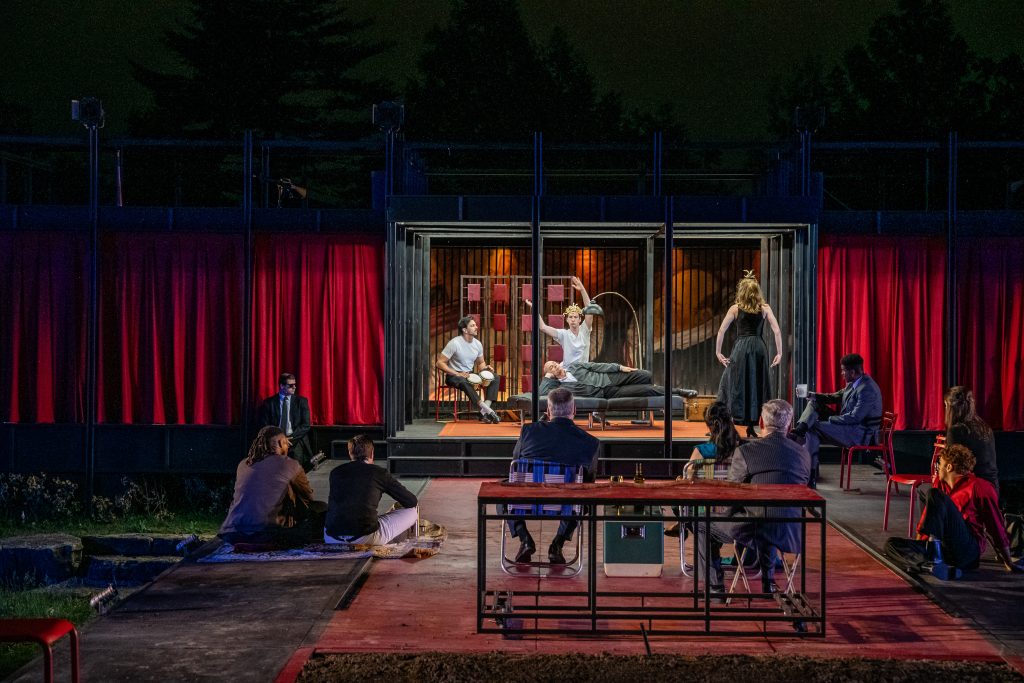
His father has been killed, and his mother Gertrude (Jennifer Ikeda) has married his uncle Claudius (Glenn Fitzgerald), who has seized the throne. He is the leading suspect in his stepson’s eyes and ever the manipulator, is trying to cast doubt on Hamlet’s stability.
“Something is rotten in the state of Denmark,” military sentry Marcellus (CB Brown) fears. Meanwhile, a war is brewing. Hamlet is a powder keg of emotion as he plunges into a downward spiral, suspecting corruption and abuse of power. A sense of foreboding is palpable.
Written around 1600, Shakespeare’s tragedy endures because of rich characters, complicated relationships and sharp observations about human nature. In the pastoral setting of Shakespeare Glen, the festival team blows the cobwebs off your English lit textbook with a fresh look at these Danish royals.
That includes a dynamic black, white, and red palette with shades of gray for unconventional statement designs – in Oana Botez’ functional, comfortable costumes (reminiscent of The Beat Generation and “Mad Men” wardrobes), Denisse Chavez’ atmospheric lighting emphasizing dramatic shadows, and Neale’s layered set. You won’t miss a palatial setting for Elsinore Castle.
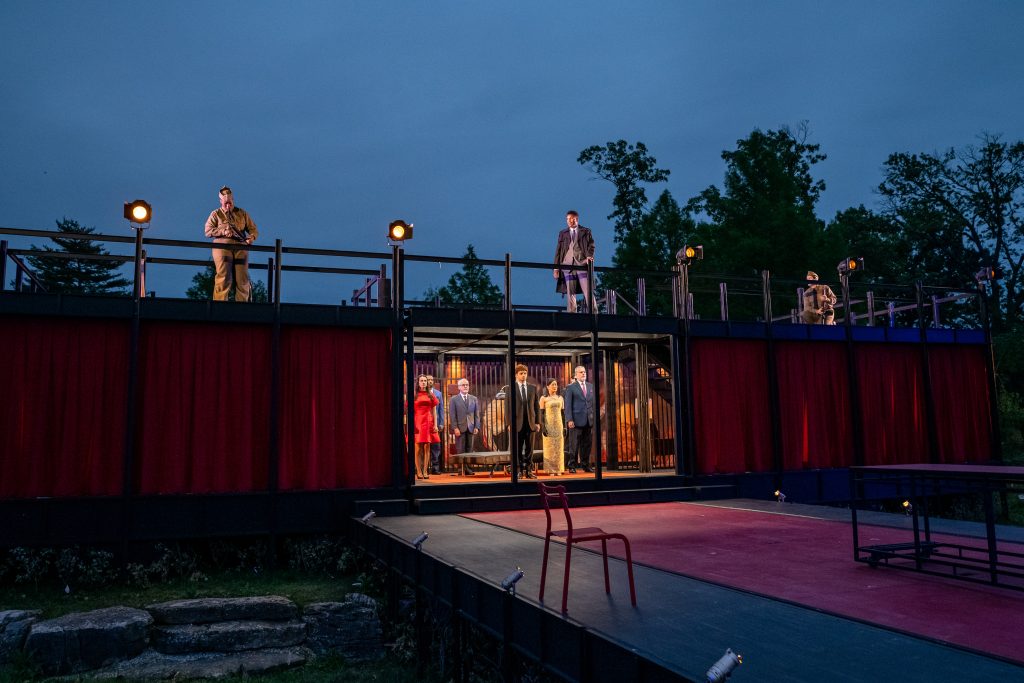
The innovative dramatizing includes a versatile thrust stage (just like Shakespeare’s Old Globe) – 50 feet that juts from the standard proscenium stage. This allows for a more intimate connection with the actors.
And if you are waiting to be wowed by Hamlet’s soliloquies, Karadsheh’s emotional pleas are in optimum positions, and his commanding delivery of one of the most famous literary passages is a joy to behold. Drink every word in of the beautiful iambic pentameter.:
“To be, or not to be, that is the question
Whether ’tis nobler in the mind to suffer
The slings and arrows of outrageous fortune,
Or to take arms against a sea of troubles
And by opposing end them. To die—to sleep,
No more; and by a sleep to say we end
The heart-ache and the thousand natural shocks
That flesh is heir to: ’tis a consummation
Devoutly to be wish’d. To die, to sleep;
To sleep, perchance to dream—ay, there’s the rub:
For in that sleep of death what dreams may come,
When we have shuffled off this mortal coil,
Must give us pause—there’s the respect
That makes calamity of so long life.“
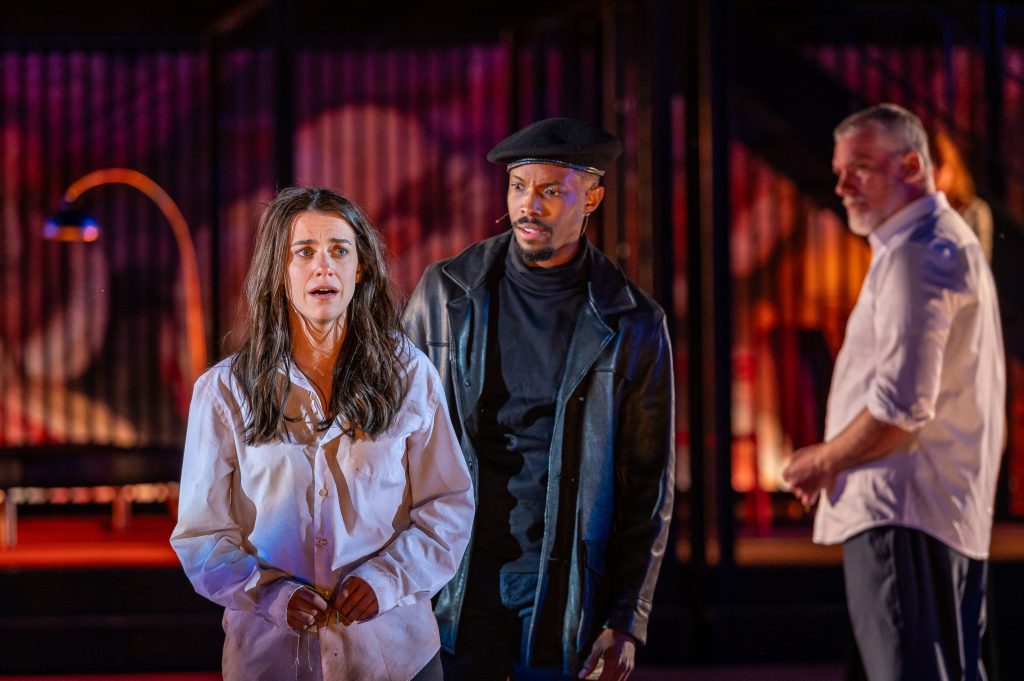
Consumed with guilt, rage and confusion, Hamlet is acting out, and not in a good way, alarming those closest to him. His mother sends for his Wittenberg University chums Rosencrantz (Mitch Henry-Eagles) and Guildenstern (CB Brown), hoping they can shed light on the situation.
His gal pal Ophelia (Sarah Chalfie) is scared, her brother Laertes (Grayson DeJesus) startled, their caring father Polonius – Claudius’ counselor – upset, and his best friend Horatio (Reginald Pierre) worried. It doesn’t help that he keeps seeing disturbing visions of his dad’s ghost.
Meanwhile, cunning Claudius is forcing power plays and mistrust to protect his secrets and lies. “That one may smile and smile and be a villain,” and Fitzgerald suits him well. Thus, Hamlet’s rebellion will bring more sadness, madness and losses.
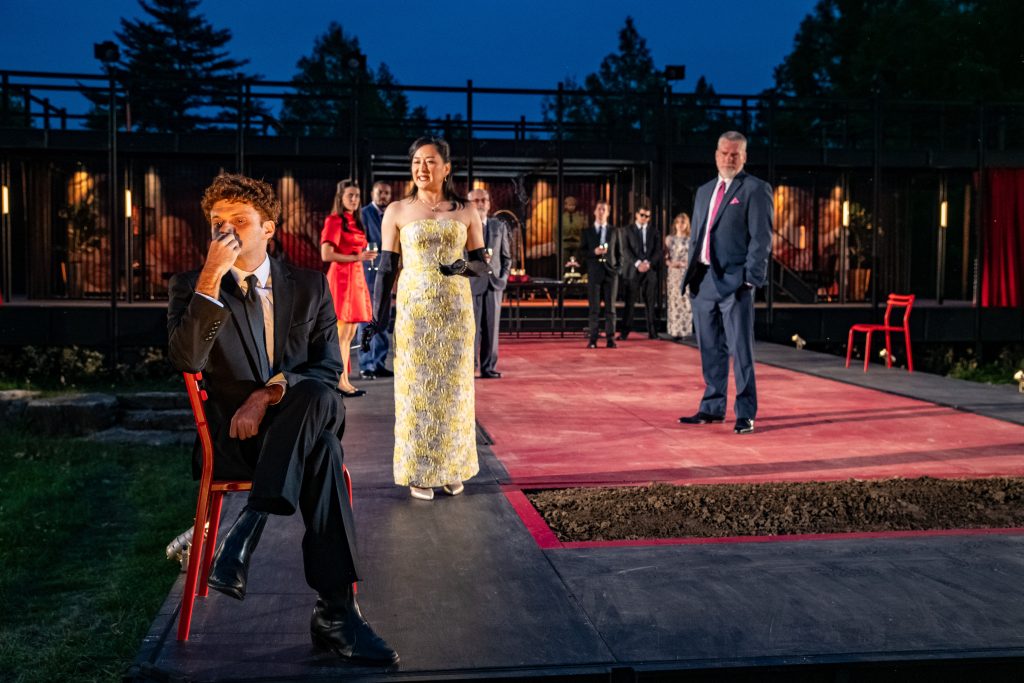
Most of all, the regal Gertrude, dressed in elegant ballgowns and cocktail attire, symbolizes wealth and aristocracy. Ikeda, who appeared as Juliet here in the fest’s inaugural production, contrasts with the young characters representing the need to explore and discover, find their purpose while they question moral decay.
Hamlet’s disgust at his mom’s choices couldn’t be clearer — “The lady protests too much, methinks.” He can’t get past what he perceives as her betrayal.
You know exactly where Hamlet is coming from when he tells Horatio: “There are more things in heaven and earth, Horatio, than are dreamt of in our philosophy.” As Hamlet’s best friend, Reginald Pierre is a harmonious Horatio, his eloquence shines through, as he does in every Shakespeare role.
Pierre is masterful in delivering a heart-tugging “Goodnight, sweet prince, and flights of angels sing thee to thy rest!”
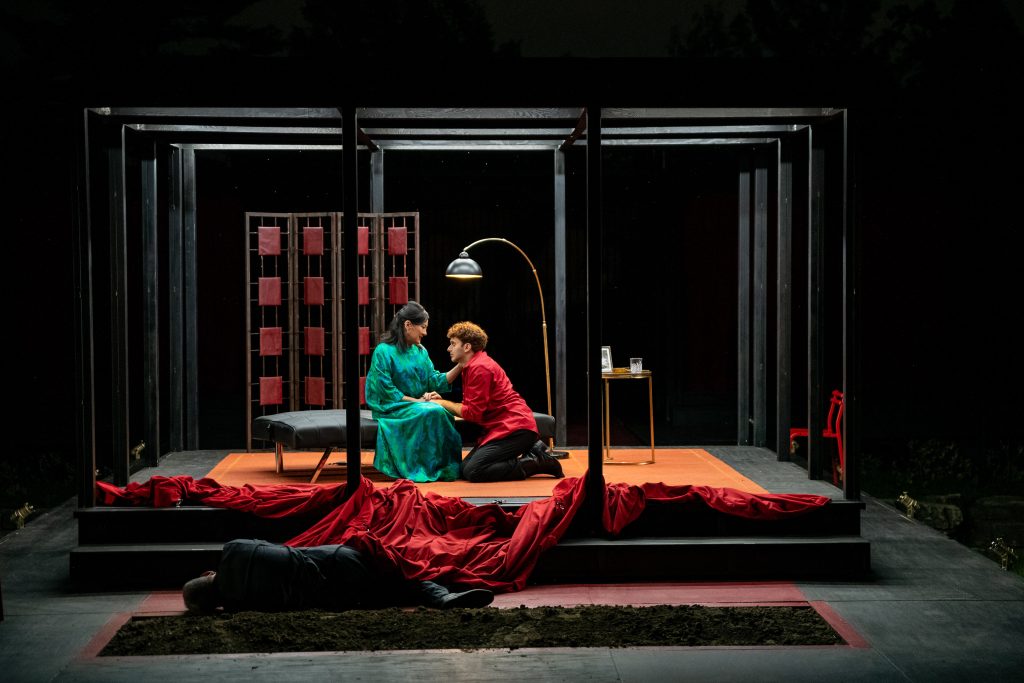
Mark Nelson excels as busybody Polonius, who is doomed by his meddling. When he advises his son and daughter “To thine own self be true,” the audience erupted in applause. He also delivers the often misquoted “Though this be madness, yet there is method in’t.”
No matter how much he tries, he can’t save his emotionally bruised daughter, who can’t cope with losing her parent. Sarah Chalfie is outstanding in her robust portrayal of Ophelia, one of the best I’ve seen.
She’s no fragile flower, not the usual whiny or showing too ethereal qualities, and instead gives a fully formed rendering of a psychologically battered young woman raised to be sweet and pretty, but there’s an independence and intelligence that she brings out too.
In real life, Chalfie is responsible for helping to save the day when original cast member Vaughn Pole was injured and unfortunately needed to be replaced as Laertes. Chalfie knew actor Grayson DeJesus had played the part twice before, and he came to the rescue. Considering that he had only four hours’ rehearsal before opening night May 30 and was so vibrant on stage was a remarkable feat. His dexterity and fervor were exceptional.
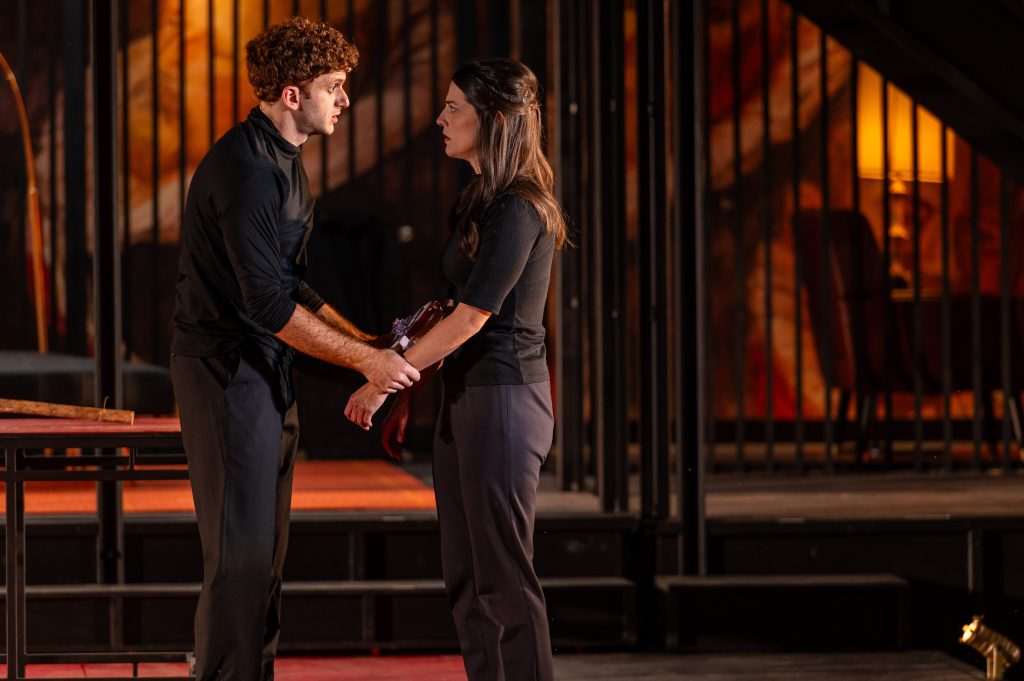
The supporting roles are fluidly handled by Max Fiorello, Daisy Held, Charlie Mathis and Ryan Omar Stack. Henry-Eagles and Brown also capably play another role other than their sharp preppies Rosencrantz and Guildenstern, and Larry Paulsen is also effective as the gravedigger, in addition to the fatherly spirit.
The presentation’s nifty flourishes in no way overshadow the passionate performances, for this tight ensemble rises to the occasion – it’s lucid, riveting and rhythmic in a way that the audience leans into the gripping action and the heartfelt agony.
Another outstanding addition to this year’s set is an eye-popping moving, motorized room that rolls up and down the stage on tracks, especially in the pivotal Polonius eavesdropping scene.
Perhaps music personifies this tale more than any other staged in recent years – although fine local musicians have added such gorgeous sounds in the previous comedies ‘As You Like It,” “Twelfth Night,” “Much Ado About Nothing” and “A Midsummer Night’s Dream.”
Music director/Composer Brandon Wolcott’s jazzy score played by East St. Louis trumpeter Brady Lewis is an integral part of the storytelling,. and recorded music sets the cinematic tone and heightens the ominous tension that builds in intensity.
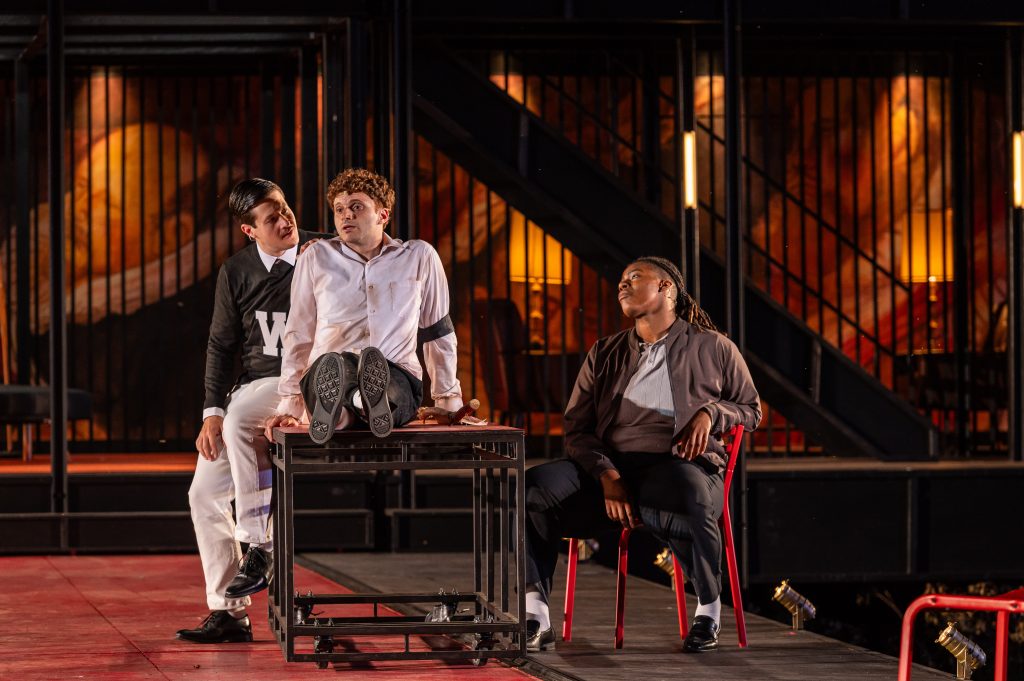
Special mentions to choreographer Sam Gaitsch for her 50s ultra-cool dance moves, Zev Steinrock for his taut fight choreography, Laura Skroska as the key props master, stage manager Sarah Luedloff and assistant stage manager Britteny Henry for their brisk work, producer Colin O’Brien and assistant director Heather Anderson for assuring that all the elements come together in fine fashion.
This nontraditional dark adaptation is refreshing because its artistic accomplishments feel organic, and its collaborative creatives and cast dazzle without artifice for a truly enthralling evening. The play’s the thing! A haunting and hypnotic “Hamlet” starts the summer off with an exclamation point, and more is in store from St Louis Shakespeare Festival — with “Romeo and Zooliet,” the touring company’s “A Midsummer Night’s Dream” in 34 parks and an original St. Louis Shake in the Streets in East St. Louis.
St. Louis Shakespeare Festival presents “Hamlet” May 28 through June 22, nightly at 8 p.m. except Mondays in Forest Park’s Shakespeare Glen (near Art Museum). Admission is free but special seating is available for a fee. For more information, visit www.stlshakes.org
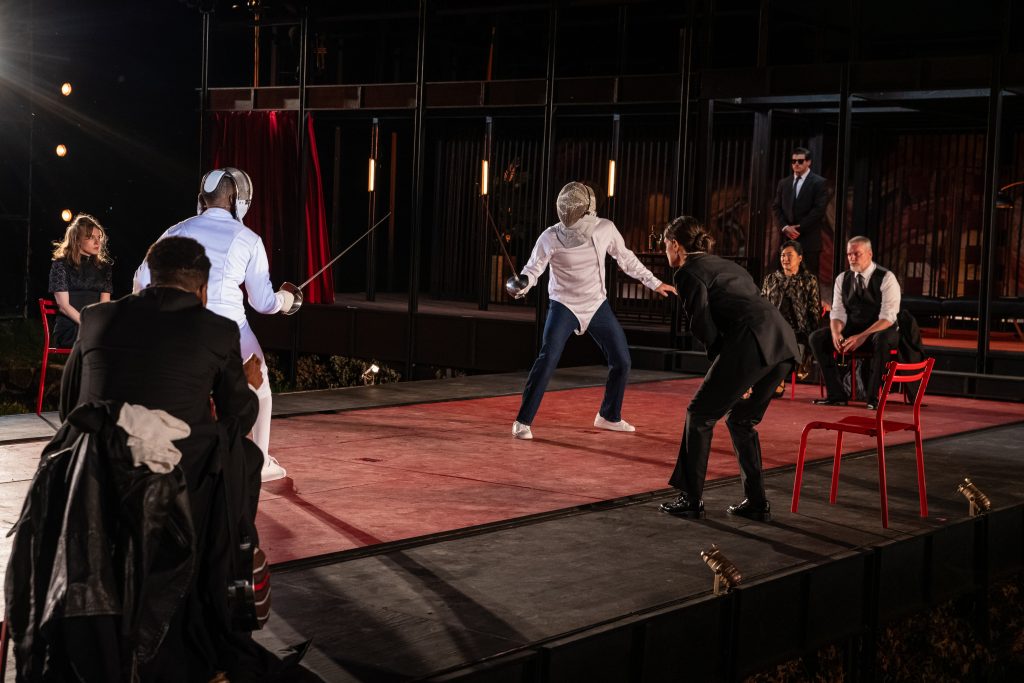

Lynn (Zipfel) Venhaus has had a continuous byline in St. Louis metro region publications since 1978. She writes features and news for Belleville News-Democrat and contributes to St. Louis magazine and other publications.
She is a Rotten Tomatoes-approved film critic, currently reviews films for Webster-Kirkwood Times and KTRS Radio, covers entertainment for PopLifeSTL.com and co-hosts podcast PopLifeSTL.com…Presents.
She is a member of Critics Choice Association, where she serves on the women’s and marketing committees; Alliance of Women Film Journalists; and on the board of the St. Louis Film Critics Association. She is a founding and board member of the St. Louis Theater Circle.
She is retired from teaching journalism/media as an adjunct college instructor.

